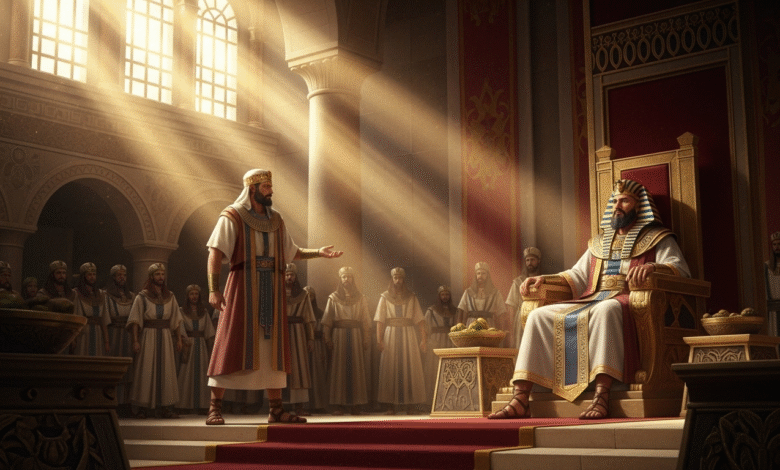The story of Pharaoh: The arrogant tyrant and the fate of the oppressors

In the history of the Qur’anic stories, there is no tyrant like Pharaoh, who is repeatedly mentioned as a symbol of gross injustice, blind arrogance, and blatant ingratitude to God’s blessings. His story is not just a passing historical tale from the pages of the past, but a timeless lesson that transcends time and space, showing how absolute power and arrogant authority can corrupt the human soul to the point of claiming divinity, and how the fate of the unjust is inevitable, no matter how long their power and tyranny lasts. It is a story of an eternal struggle between absolute injustice that knows no boundaries, and the revealed truth that does not come from between his hands or behind him, in which the greatness of God Almighty and His absolute ability are manifested in the victory of the weak and patient and the destruction of the arrogant and ungrateful.
An arrogant king and unjust slavery: Egypt under Pharaoh before Moses
Pharaoh was king of Egypt, and his arrogance, pride and conceit reached the point of claiming godhood and divinity for himself, as he said to his people: “I am your supreme Lord” (Al-Nazu’at: 24), and he said: “I have not known for you any other god besides me” (Al-Quraysh: 38). He imposed his absolute authority over his people and enslaved the Israelites, the descendants of the Prophet Jacob, peace be upon him, who had been living in Egypt since the time of Joseph, peace be upon him. Pharaoh made them a vulnerable sect in his land, inflicting the most severe torture and humiliation on them, using them in hard labor and great construction, slaughtering their newborn male children and keeping the females alive. This brutal persecution stemmed from a vision Pharaoh saw, or a prophecy he received from his priests, indicating that a child born of the Israelites would be the cause of his demise.
Qur’anic evidence: The Qur’an describes his condition and the condition of his people under his power in Surat al-Qasas, highlighting his tyranny and corruption:
إِنَّ فِرْعَوْنَ عَلَا فِي الْأَرْضِ وَجَعَلَ أَهْلَهَا شِيَعًا يَسْتَضْعِفُ طَائِفَةً مِّنْهُمْ يُذَبِّحُ أَبْنَاءَهُمْ وَيَسْتَحْيِي نِسَاءَهُمْ ۚ إِنَّهُ كَانَ مِنَ الْمُفْسِدِينَ
(Stories: 4).
In this atmosphere fraught with fear, anticipation and unbearable persecution, God’s wisdom and power decreed that a child would be born among the Israelites, who would later become his sworn enemy and the cause of his destruction, namely Moses, peace be upon him.
The story of Moses’ birth and upbringing in Pharaoh’s house: The story of Moses’ birth and upbringing in Pharaoh’s house
In the story of the birth of Moses, the first sign of God’s miraculous management of Pharaoh’s fate is evident, and how God arranges things where humans do not expect. The mother of Moses, at the height of her fear and confusion over her newborn from the oppression of Pharaoh and his soldiers, was inspired by a great and very strange divine command, one that transcends all human logic: To place her infant son in a small wooden coffin and throw him into the flowing Nile River. This was a tremendous challenge to her faith and trust in her Lord, how could she throw her baby boy into an unknown fate between the waves of the river? But she trusted in the promise of her Lord, who does not break the promise, to return him to her and make him one of the messengers.
Qur’anic evidence: This miraculous revelation that reassured the frightened mother is recorded in Surah Taha:
وَأَوْحَيْنَا إِلَىٰ أُمِّ مُوسَىٰ أَنْ أَرْضِعِيهِ ۖ فَإِذَا خِفْتِ عَلَيْهِ فَأَلْقِيهِ فِي الْيَمِّ وَلَا تَخَافِي وَلَا تَحْزَنِي ۖ إِنَّا رَادُّوهُ إِلَيْكِ وَجَاعِلُوهُ مِنَ الْمُرْسَلِينَ
(Taha: 38).
She threw him into the river, and his sister Maryam walked to follow his trail in secret, watching his fate with anxiety and anticipation. By God’s power and wisdom, Pharaoh’s servants picked him up from the river and presented him to Pharaoh and his righteous woman, Asia. She saw light and innocence in the child, and begged Pharaoh not to kill him, but to take him as their son, to be the apple of her and his eye.
Here is another miracle in the chain of divine providence: The infant Moses refused all the nurseries brought to him by the women of Egypt. His sister suggested that she show them a household that would sponsor him and nurse him, and they agreed. Thus, Moses was returned to his mother to nurse and foster him in the palace of Pharaoh himself, for which she was paid, and God’s promise to return him to her and make him one of the Messengers was fulfilled. Moses grew up in Pharaoh’s palace, in glory and bliss, learning the arts of government and administration, but his heart was with the Israelites who were oppressed and enslaved outside the palace walls, seeing with his own eyes the injustice inflicted on them.
The killing incident and the migration to Midian: Maturity and preparation for the Great Commission
When Moses was of age, physically and mentally strong, and was walking in the city, he found two men fighting: One was an Israelite (his people) and the other was a Coptic (Pharaoh’s people). The oppressed Israelite called for help, and Moses poked the Coptic so hard that he accidentally killed the Coptic. Moses regretted his action and realized that he had done wrong, so he turned to his Lord in repentance and forgiveness.
Qur’anic evidence: The Almighty said on the tongue of Moses, peace be upon him, confessing his guilt and asking for forgiveness:
قَالَ رَبِّ إِنِّي ظَلَمْتُ نَفْسِي فَاغْفِرْ لِي فَغَفَرَ لَهُ ۚ إِنَّهُ هُوَ الْغَفُورُ الرَّحِيمُ
(Surat al-Taqs: 16).
Pharaoh learned of the incident and wanted to kill him as retribution for the Coptic. A man from the far end of the city (said to be a believer of Pharaoh’s family) advised Moses to flee the city quickly, because Pharaoh and his people were plotting to kill him. Moses went out in fear, not knowing where to go, but he relied on his Lord and prayed: “Lord, deliver me from the unjust people” (Stories: 21).
Moses set out for the land of Midian, a land outside of Pharaoh’s dominion. After an arduous journey, he arrived at a water well, where he found shepherds watering their flocks and two women tending to their sheep. Moses went ahead and watered them, then went into the shade and prayed to his Lord. Their father, the Prophet Shu’ayb, peace be upon him (or a righteous man from the people of Midian), learned of Musa’s strength and honesty, so he invited him to him and married him to one of his two daughters, and Musa stayed for ten years, during which he completed his dowry, in a quiet environment away from the oppression of Pharaoh, learning to herd sheep, maturing and preparing to carry the great message and confront tyranny.
Revelation and prophecy: God’s speech and unbelievable miracles
After Moses had completed the agreed-upon period of time, he and his people set out to return to Egypt. On the way back, on a cold, dark night, near Mount Tor, he saw a fire in the distance. He went to investigate the matter, and there was the great encounter and the direct divine instruction that no other prophet had ever received. His Lord called him from the right-hand side of Al-Tur in the blessed spot of the tree.
Qur’anic evidence: The Qur’an describes this majestic meeting that witnessed the beginning of Moses’ prophethood in Surah Taha and Al-Qasas:
فَلَمَّا أَتَاهَا نُودِيَ مِن شَاطِئِ الْوَادِ الْأَيْمَنِ فِي الْبُقْعَةِ الْمُبَارَكَةِ مِنَ الشَّجَرَةِ أَن يَا مُوسَىٰ إِنِّي أَنَا اللَّهُ رَبُّ الْعَالَمِينَ (30) وَأَنْ أَلْقِ عَصَاكَ ۖ فَلَمَّا رَآهَا تَهْتَزُّ كَأَنَّهَا جَانٌّ وَلَّىٰ مُدْبِرًا وَلَمْ يُعَقِّبْ ۚ يَا مُوسَىٰ أَقْبِلْ وَلَا تَخَفْ ۖ إِنَّكَ مِنَ الْآمِنِينَ (31) اسْلُكْ يَدَكَ فِي جَيْبِكَ تَخْرُجْ بَيْضَاءَ مِن غَيْرِ سُوءٍ ۖ وَاضْمُمْ إِلَيْكَ جَنَاحَكَ مِنَ الرَّهْبِ ۖ فَذَانِكَ بُرْهَانَانِ مِن رَّبِّكَ إِلَىٰ فِرْعَوْنَ وَمَلَئِهِ ۚ إِنَّهُمْ كَانُوا قَوْمًا فَاسِقِينَ (32)
(Surat al-Taqs: 30-32).
In this great encounter, God gave him two great miracles as proof of his prophethood before Pharaoh: His staff that turns into a seeking serpent (a great snake), andhis hand that comes out white without evil (it shines a light white). He ordered him to go to Pharaoh to call him to the monotheism of God and to free the Israelites from his slavery. Moses was awed by the greatness of the task, and asked his Lord to send his brother Aaron with him, because he was more eloquent and able to explain, so God answered his prayer and made Aaron a prophet and minister to strengthen his strength.
The great confrontation with Pharaoh: Miracles and endless stubbornness
Moses and Aaron, peace be upon them, returned to Egypt, entered Pharaoh, presented to him the call of pure monotheism, and asked him to send the Israelites with them. But Pharaoh was arrogant and stubborn, and increased his tyranny, accused them of magic, and gathered the most skilled magicians of Egypt to confront them on a great feast day, the Day of Adornment, in front of a large crowd of people, to show his power and defeat Moses in front of everyone.
On the Day of Adornment, Moses met with Pharaoh’s magicians. The magicians threw their ropes and sticks, and they turned into living creatures with a great optical illusion that amazed the audience. Then Moses threw his staff, and it turned into a great serpent, devouring all the ropes and sticks thrown by the magicians. In front of this remarkable miracle that exceeded the limits of human magic, the magicians realized that this was not magic, but a truth from God and a divine power, and they prostrated themselves, believing in the Lord of Moses and Aaron.
Qur’anic evidence: The Qur’an depicts the magicians’ faith and change of heart in Surah Taha:
قَالُوا آمَنَّا بِرَبِّ هَارُونَ وَمُوسَىٰ
(Surat Taha: 70).
Pharaoh was angered by the faith of his magicians, and he punished them severely, cutting off their hands and feet, and crucifying them, but they stood firm in their faith and faced death with certainty. God then sent a series of signs (miracles) to Pharaoh and his people as a conclusive proof of Moses’ sincerity and as a punishment for their disbelief and stubbornness. Whenever a calamity befell them, they appealed to Moses to lift it from them, promising to believe and send the Israelites, but when God revealed it, they reneged on their covenant and became arrogant again.
Qur’anic evidence: The Qur’an mentions these verses in Surat al-A’raf (beginning with verse 130) and in detail in other suras:
- Floods: Heavy rains and floods inundated their land and homes, destroying their crops.
- Locusts: Huge swarms of locusts ate the remnants of their crops and ruined everything else.
- Lice: Lice infest their bodies and homes, causing discomfort and itching.
- Frogs: Frogs flooded everywhere, their homes, their bedding, their eating, their drinking.
- Blood: The water of the Nile and all drinking water turned into blood, and they could not find drinkable water.
- Lack of fruits: Their crops are severely deficient.
- Years: The famine and drought that afflicted the country.
- Hand and stick: The two original miracles that Moses came with.
- Divide and conquer: (or the stick and the white hand)
But the heart of Pharaoh and his people had hardened, and they only became more arrogant and stubborn, until they reached a point of no return.
Chasing the Israelites: The culmination of tyranny and inevitable doom
After all these signs, and after Moses despaired of the faith of Pharaoh and his people, and after he had exhausted all means of invitation and warning, God inspired him to take the Israelites by night from Egypt. Moses complied with his Lord’s command, and the Israelites, who numbered in the hundreds of thousands, set out towards the Red Sea, leaving behind years of slavery.
Pharaoh learned of their departure, became furious, felt that his kingdom was collapsing, and mobilized his great army with all his cavalry and equipment, and went after them with unparalleled anger and hatred, determined to annihilate them and crush them to the ground. Pharaoh and his army caught up with Moses and the Israelites on the shore of the Red Sea. The Israelites found themselves in an inescapable situation: The sea in front of them with its huge waves, and Pharaoh’s huge army behind them, marching towards them. Despair and fear gripped the hearts of the Israelites, and they said to Moses: “We are doomed!” (i.e., Pharaoh will surely catch up with us and destroy us).
But Moses, peace be upon him, was an example of fortitude and absolute certainty of God’s victory. He answered them with a reassuring and confident heart, knowing that God is with him and will not let him down:
Qur’anic evidence: The Almighty said in Surat al-Shu’araa, emphasizing God’s providence:
قَالَ كَلَّا ۖ إِنَّ مَعِيَ رَبِّي سَيَهْدِينِ
(Poets: 62).
At that crucial moment, God’s miraculous command came to Moses to strike the sea with his staff.
Qur’anic evidence: The Qur’an describes this miraculous miracle that can only be believed by God in Surat al-Shu’araa:
فَأَوْحَيْنَا إِلَىٰ مُوسَىٰ أَنِ اضْرِب بِعَصَاكَ الْبَحْرَ ۖ فَانفَلَقَ فَكَانَ كُلُّ فِرْقٍ كَالطَّوْدِ الْعَظِيمِ (63) وَأَزْلَفْنَا ثَمَّ الْآخَرِينَ (64) وَأَنجَيْنَا مُوسَىٰ وَمَن مَّعَهُ أَجْمَعِينَ (65) ثُمَّ أَغْرَقْنَا الْآخَرِينَ (66)
(Poets: 63-66).
The great sea was split by the power of God, and a dry road appeared between two great mountains of accumulated water. Moses and the Israelites crossed it in peace and safety. When Pharaoh and his soldiers followed them, they entered the dry road, and the moment the last of them entered, the sea closed over them by God’s command, and they all drowned, and none of them survived, so that their destruction would be an example to the world. Pharaoh was thrown on the shore for people to see, and God preserved his body to remain a sign for those who come after him, a proof of the fate of the proud oppressors.
Qur’anic evidence: The Almighty said in Surah Yunus:
فَالْيَوْمَ نُنَجِّيكَ بِبَدَنِكَ لِتَكُونَ لِمَنْ خَلْفَكَ آيَةً ۚ وَإِنَّ كَثِيرًا مِّنَ النَّاسِ عَنْ آيَاتِنَا لَغَافِلُونَ
(Yunus: 92).
[You can read more about the story of Moses and his miracles in our article on islamly.net: The story of Moses, peace be upon him: The great confrontation, the miracles of survival, and the liberation of the Israelites from oppression ](To see the Pharaoh’s mummy preserved in the Egyptian Museum as historical evidence for this story, you can visit this link: Pharaoh Ramses II’s mummy)
God’s victory freed Moses and the Israelites from centuries of slavery and persecution, and they began a new life of freedom and worship of God alone, after they saw with their own eyes how God intervenes to uphold the truth.
Epilogue: Immortal lessons in the fate of the oppressors and the greatness of God’s power
The story of Pharaoh and Moses, peace be upon him, is one of the richest stories in the Qur’an with endless lessons and lessons:
- The fate of injustice and tyranny: The story of Pharaoh is a constant warning to every arrogant and mighty person who oppresses people and dominates the earth, that the end of injustice is dire and painful, that God is patient and does not neglect, and that divine justice will inevitably be realized.
- Absolute certainty of God’s victory: Even in the darkest and most desperate circumstances, when the sea is in front of you and the enemy is behind you, the certainty that God is with you is the key to relief and survival, and that sincere tawakkul opens the doors of the impossible.
- The greatness of God’s providence: How God manages things from where humans do not expect, raising the enemy of the oppressor in his own house, and destroying him by the weakest of causes (the water that he was proud of and controlled).
- The importance of persistence in the face of falsehood: The story of Moses highlights the importance of prophets and preachers remaining steadfast to the truth, not being afraid of the oppressors’ oppression, and that victory belongs to the patient believers who trust in God’s promise.
- Miracles of God: A sign of His oneness and power: The miraculous miracles with which God supported Moses were conclusive proofs of God’s oneness, His absolute ability to change cosmic laws to protect His servants and uphold the truth, and that every force in the universe is subject to His command.
- Joy after adversity: The whole story is a series of adversity followed by joy, to teach the nation that with hardship comes ease, that victory comes after patience, and that the end of every adversity is a divine blessing.
The story of Pharaoh is a constant testimony that there is no victor except Allah, that the outcome is for the pious, and that Allah does not fail His believing servants, but rather saves them, gives them victory and empowerment, and destroys their enemies in a clear destruction, so that they may be an example for future generations.
Audio summary
What is the most important lesson that the story of Pharaoh and his fate has left you with after reading it in such detail?




